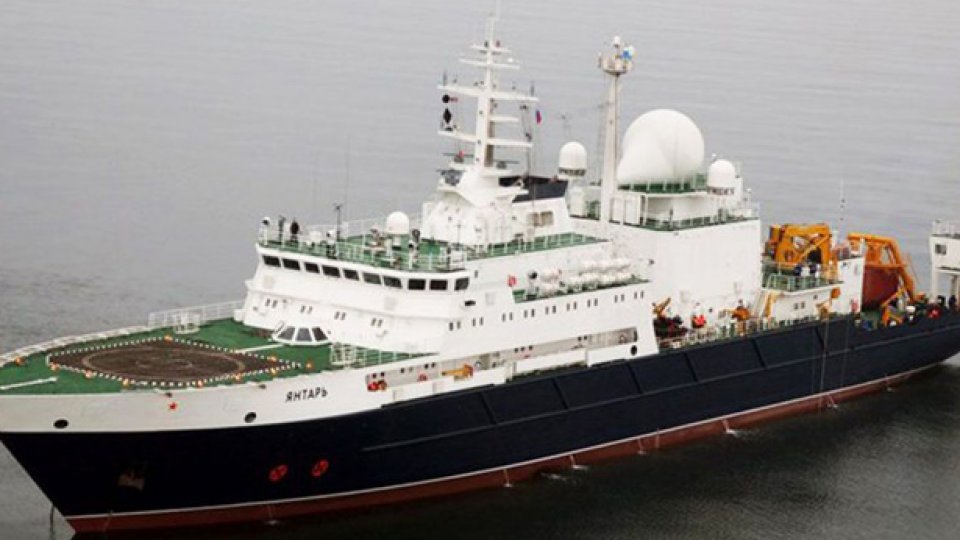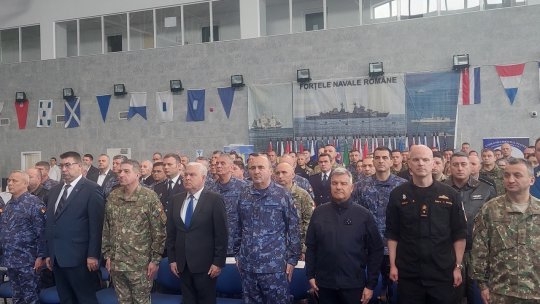Russian tactical ship for hybrid war
The tactical vessel for the hybrid war can secretly tap undersea cable information streams and disable undersea communication lines, simulating “oceanic research” or “search-and-rescue activities”.

24 Ianuarie 2018, 22:00
Russia's attack or multipurpose submarines are not the only capabilities that this country counts on in its underwater operations. Moscow has made efforts to develop a naval capacity for hybrid and submarine actions.
The tactical vessel for the hybrid war combines specific civil and military, conventional and special, technological and operational capabilities. Among other missions and tasks, this allows such naval platforms to secretly tap undersea cable information streams as well as disable undersea communication lines, if needed. According to retired Ukrainian Admiral Ihor Kabanenko, such “dual use” assets directly fit Russia’s hybrid warfare doctrine, as they can conduct clandestine underwater operations under the cover of, for example, carrying out “oceanic research” or “search-and-rescue activities”. Admiral Ihor Kabanenko states for the Jamestown Foundation website that at least two such hybrid warfare maritime platforms are being built and operated by Russia.
The first is Russia’s so-called “nuclear deep-water station” which, in reality, is actually a deep-water special operations submarine (DWSOS). It can be transported inside a special nuclear submarine carrier vessel and it can be deployed to any ocean spot around the world to start long-term secret missions. In recent years, Russia has commissioned or modernized Kalitka, Kashalot, Paltus and X-Ray vessels from the DWSOS class. Admiral Kabarenko considers that the most capable of these is the Kalitka (nicknamed the “Losharik”), commissioned in 2006. This sub is capable of diving down to 6,000 meters and can be used to destroy seabed infrastructure, primarily undersea communication lines.
Moscow has also increased the number of DWSOS carriers in its fleet as well: the Delta IV–class special nuclear submarine Podmoskovye is conducting sea trial after its modernization. And the next generation of submarine-carriers is already undergoing refitment. All of the above-mentioned assets belong to 29th Special Purpose Submarine Brigade of the Russian North Fleet.
In addition to DWSOSs, the second major asset type for conducting underwater hybrid warfare are Russia’s so-called “oceanographic research vessels” (ORV) and “search-and-rescue vessels” (SRV). None of these surface ships carry anti-submarine warfare (ASW) weapons or cruise missiles on board, but their strategic intelligence-gathering capabilities against seabed targets are extremely sophisticated. Both types of ships belong to the Russian Ministry of Defense, most precisely to its Main Directorate of Underwater Research (ORV) and to the Search and Rescue Service of the Russian Navy (SRV).
Russia’s most advanced ORV is probably the Yantar, commissioned in 2015. This spy ship has surveillance equipment and serves as a mothership for manned as well as unmanned deep-sea submersibles. The Yantar carries two Russian Rus– and Konsul-class manned underwater vehicles (MUV) capable of diving up to 6,000 meters for 10–12 hours at a time. These MUVs have cable-cutting tools. Moreover, they carry remotely operated underwater drones (ROUD), which can perform a wide spectrum of tasks: from object inspection and destruction, to delivering various devices to the seafloor or lifting objects to the surface.
As an alternative to building next-generation ORVs or SRVs, Moscow is modernizing the old vessels of these classes due to budget restrictions in Russia’s shipbuilding program. Modern equipment for acoustic, biological, physical and geophysical surveys have already been installed onboard the Admiral Vladimirsky ORV. This ship is now conducting expeditions across various international maritime areas operationally important to Russia, Admiral Ihor Kabarenko maintains.
NATO has already responded to this increasingly perceived threat from Russia’s growing underwater activity. The Alliance has set plans to reestablish a command post that had been shut down after the Cold War, to help secure the sea lines of communications in the North Atlantic (UNIAN, December 2017). The allies have also rushed to boost their ASW capabilities and to develop advanced submarine-detecting planes. But NATO still has more to do to protect undersea communications and Internet cables in the North Atlantic as well as the Mediterranean against Russian hybrid underwater activity.
Ihor Kabanenko, the author of this article published by Jamestown Foundation, is a retired admiral with the Ukrainian Navy. From 1983 to 1990, he served in the Soviet Navy in various positions up to Commander of the ship and Chief of Staff of Missile Ships Division. Since 1993, he served in the Ukrainian Armed Forces. He was appointed to the positions of Chief of Operations and Chief of Staff of the Ukrainian Navy, the Military Representative of Ukraine to NATO, Chief of Operations of the Ukrainian Armed Forces, and the First Deputy Chief of Defense. He retired in 2013, with the rank of Admiral. In 2014, Admiral Kabanenko served as the Ukrainian Deputy Minister of Defense, and then Deputy of the Ukrainian Minister for European Integration.
Source:RRA.Translated by Miruna Matei









